
This week on Up Close And Personal we talk with Justin Bieber’s producer George Leslie.

This week on Up Close And Personal we talk with Justin Bieber’s producer George Leslie.
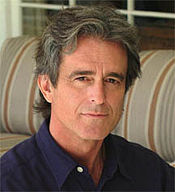
Bobby Shriver is the brother of our state’s former First Lady, Maria Shriver. He’s the son of Sargent Shriver, who started the Peace Corps, and the nephew of President Kennedy. Bobby Shriver is a graduate of Yale Law School, and has also served as mayor of Santa Monica. He is now running for a seat on the Los Angeles County Board of Supervisors as an environmentalist promising to ‘…clean up Santa Monica Bay and the beaches, and to create and maintain our parks.’
Hunter Schwarz writes for BuzzFeed, and has been looking into Bobby Shriver’s investments.
Listen to the original broadcast
David: Hunter, you write in BuzzFeed, ‘He purchased $1.1 million in oil and gas stocks in 2010,’ companies that do offshore drilling?
Hunter: Yeah, that’s correct.
David: What companies?
Hunter: Exxon Mobil, Occidental Petroleum, Sunoco Logistics Partners, TransOcean. TransOcean is the offshore drilling company that was behind the oil leak in the Gulf of Mexico a few years back.
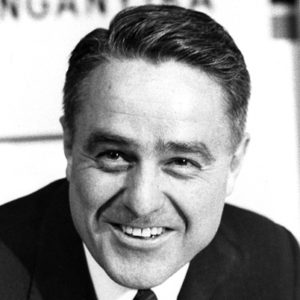
Bobby Shriver’s father, R. Sargent Shriver, was the first director of the Peace Corps and was Senator George McGovern’s running mate in 1972.
David: When you say he’s bought oil companies, a lot of people his age buy mutual funds that are a basket of stocks, and they end up unwittingly owning stocks in oil companies. But you’re saying that he went out and purposely purchased stock in TransOcean, which helped contribute to the BP oil spill?
Hunter: Bobby Shriver said himself that the only stocks that he specifically picked were Berkshire Hathaway, Harley Davidson and Starbucks. That’s what the campaign is saying, that these were oil drilling stocks that other people picked for him.
David: Well, he did work as a venture capitalist at one time in his life.
Hunter: He told the Los Angeles Times that when he had people pick stocks for him, he had one thing that he wouldn’t let them do, and that was buy stocks from companies in South Africa during apartheid. That was the only prohibition he’s ever placed on any purchase of stock.
David: What is the Arctic Royalty Limited Partnership?
Hunter: The Arctic Royalty Limited Partnership had 143 oil and gas lease sites in Texas and Oklahoma.
David: This is a company that is drilling for oil in Texas and Oklahoma?
Hunter: Yeah, mm hmm.
David: He receives royalties from these drilling sites?
Hunter: In 2011, he made between $10,000 and $100,000 from Arctic Royalty Limited Partnership.
David: Okay. That’s not a lot of money for a Kennedy, is it?
Hunter: No. But he has a lot more that is invested in his stock portfolio. It’s a minor thing, but it is there on his public records about his economic interests.
David: Have you looked at his entire investment portfolio?
Hunter: I’ve looked at everything that he’s filed for the past several years.
David: Do you know what his net worth is?
Hunter: No, I do not.
David: Does he have to reveal what his net worth is?
Hunter: I’m not sure. The thing with these public records is they’re not too specific, like, it says that he owns stock in Exxon Mobil, but when it says how much he actually owns, it just says $10,000 to $100,000. So that gives you this huge range, and that’s about as specific as it gets.
David: Right.
Hunter: There’s only a few public records that give us a glimpse into his finances.
David: These are not oil stocks that he inherited. What are the other stocks that he’s purchased?
Hunter: El Paso Pipeline, Enbridge Energy Partners, Energy Transfer Partners, Enterprise Product, OEG Resources, NuStar Energy, Plains All American Pipeline, Southwestern Energy.
David: These are the stocks that he purchased for $1.1 million in 2010. Correct?
Hunter: To $1.1 million, that’s the maximum it could be.
David: I’m sorry, when you say it’s the maximum it could be, what do you mean by that?
Hunter: With the very big range that he could have purchased, he doesn’t have to say exactly how much he got. And so, if you add up all the stocks that he purchased and the maximum amount that he listed he could have purchased it for, it totals to $1.1 million.
David: And if you were to give him the benefit of the doubt, what would the low end of that total purchase be?
Hunter: Just over $100,000.
David: In 2010?
Hunter: Mm-hmm. Correct.
David: It’s fair to say then that in 2010, he could have purchased anywhere between $100,000 to $1.1 million of stock in 11 oil/gas companies, correct?
Hunter: Correct.
David: And it wouldn’t be lower than $100,000?
Hunter: No.
David: So that’s just for 2010, alone. Caroline Kennedy (his first cousin), our ambassador to Japan, is also part of the Arctic Royalty Limited Partnership?
Hunter: Mm-hmm.
David: But this week she spoke out against the dolphin hunt going on in Japan.
Hunter: Yeah.
David: What is Bobby Shriver’s record on the environment? Even though he owns stock in these companies, could he still be an environmentalist?
Hunter: From 2001 to 2008, he was Chairman of the State Parks and Recreation Commission. While he was mayor of Santa Monica, he pushed for Measure V. Measure V was passed in 2006, and it raised property taxes for urban runoff, water quality and treatments. He does have a record of supporting environmental issues.
David: Well, Hunter Schwarz writes for BuzzFeed, and he’s been looking into Bobby Shriver’s investments. Thank you for doing that.
Listen to the original broadcast
What do you think? Can a politician own stock in oil companies and still protect our environment? Leave a comment down below.

Updated on the hour. Hey, one thing you have to say about Obama is he finally rid this nation of that nasty “imperial presidency” thing.
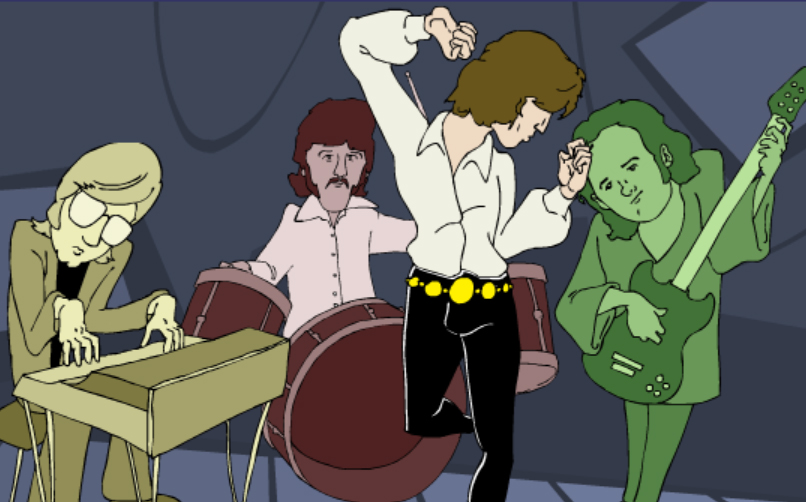
YOU are the lizard king now, and YOU and do anything! Push a button and relive the magic of Jim Morrison, right from your computer! Break on through, folks!
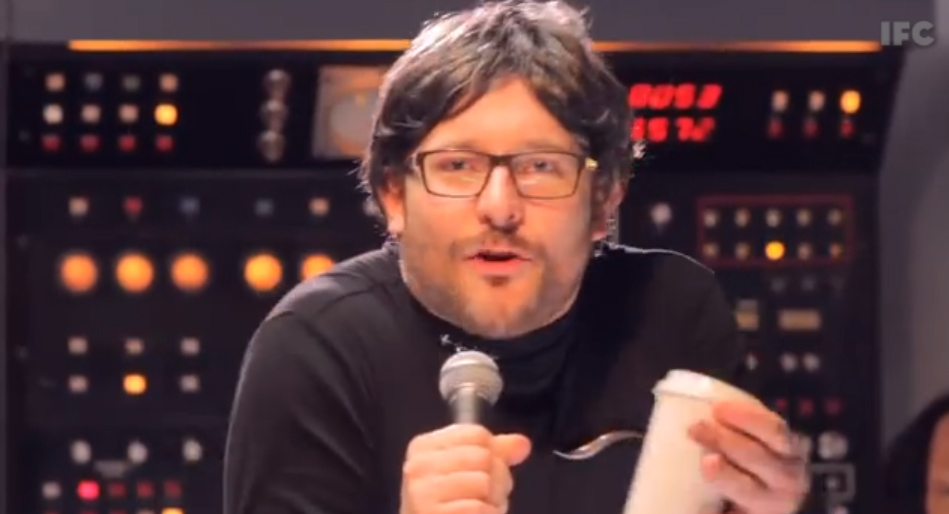
Comedian Marc Maron and Star Trek collide in this parody mini series from IFC, featuring the brilliant James Adomian as the cat loving, coffee drinking funny man. Set phasers to WTF!
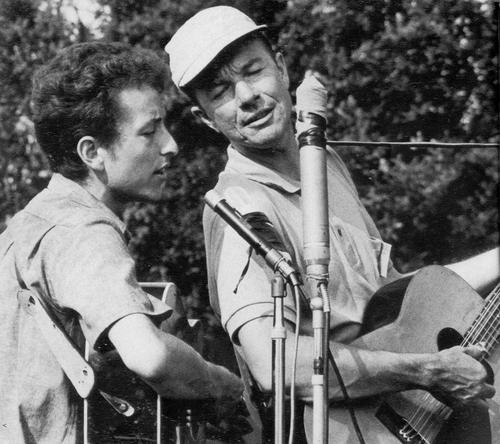
For more decades than he’s willing to admit, David Wild has been a contributing editor to Rolling Stone Magazine. David Wild has interviewed everyone in music, from Bob Dylan to the Backstreet Boys, as well as Pete Seeger. He talked to us from Los Angeles.
Listen to the original broadcast
Feldman: David, you’re from Tenafly, New Jersey. I’m from Englewood, New Jersey. We’re about the same age, and we were both introduced to Pete Seeger through Clearwater. What was Clearwater?
David Wild: Clearwater was a sloop. It was a ship brought to educate, especially kids like us who grew up on the Hudson River, about the environment, about ecology, about the importance of preserving bodies of water. It helped raise up another generation of kids who might keep the world going a few more years.
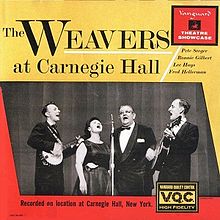
David Wild suggests a good introduction to Pete Seeger would be listening to The Weavers at Carnegie Hall.
Feldman: When you were growing up in Tenafly and I was growing up in Englewood, we were right near the Hudson River. Were we allowed to swim in the Hudson River when we were growing up?
David Wild: No, that was the era of major rivers catching fire, from pollutants. Thanks to people like Pete Seeger, Don McLean, another folk singer who seemed to take it on, progress was made. And you and I were lucky enough to get a little education early on from people like Pete Seeger about the global consequences of pollution.
Feldman: What kind of influence did Pete Seeger have on musicians like Bruce Springsteen, Tom Morello from Rage Against the Machine, and, of course, the Backstreet Boys?
David Wild: Fundamentally, he was one of the defining and enduring figures who taught generations of musicians that being a musician, despite what your record company insisted, you had responsibilities besides just getting a hit. He inspired generations of artists to use the power of music to do some good. Pete Seeger set the tone for a world in which George Harrison would try to help with Bangladesh all the way to “We Are the World” and on through guys like Tom Morello or Bruce Springsteen who are probably the most effective musical figures out there right now galvanizing the political power of music to help everyone.
Feldman: Any other musicians you can think of?
David Wild: He would be the pivotal figure. You know, along with Woody Guthrie, Odetta, he’s part of that line. But he was also, I think for Bob Dylan, a sort of complex figure because ironically, to Bob Dylan, Pete Seeger was on the right of what he was doing. Pete Seeger stood for traditional acoustic folk, and Bob Dylan, by going electric, upset the lefties and put them in the position of being the conservatives.
Feldman: But politically, Pete Seeger always remained to the left of Bob Dylan. Wouldn’t you say Bob Dylan has been more cryptic about his politics?
David Wild: Oh yeah. Bob Dylan lost all interest in being a strictly political figure, partly because the Beatles and Bob Dylan were cross-pollinating, and all of a sudden, this world of possibilities musically opened up to Dylan. And he didn’t really continue in the Woody Guthrie or Pete Seeger tradition of just being a spokesman. Increasingly, when Bob Dylan got famous, he was put off, if not repulsed by the idea of being a spokesman. Whereas someone like Pete Seeger, his whole life he wanted to use his voice to change things. To change things for the better, as he saw them politically.
Feldman: Young people listening, or people who accidentally hit the KPFK button, stuck in traffic, and don’t know who Pete Seeger is, what would be some Pete Seeger essentials?
David Wild: Knowing the world of Columbia records there may even be a release called The Essential Pete Seeger. But I would say Weavers at Carnegie Hall, and I think anything live, because I think it was about the connection with the audience. And not just the connection emotionally, which all artists have, it was literally a connection that tried to communicate and pass something on, which is the heart of the folk tradition. I would always go for a live recording. I would also push people towards the Springsteen tribute. Pete Seeger, when I spoke to him, told me that because of his lefty politics – this is actually a quote. I was looking up the transcript I had done. He said, “Because of my lefty politics, I was pretty much left alone my whole life. And then the Bruce Springsteen tribute came along and it blew my cover.” Because Pete Seeger was very comfortable in this world, but he also made a lot of rich and powerful people uncomfortable with his music.
Feldman: Was Bruce Springsteen from New Jersey?
David Wild: I hear he might be from somewhere in that Garden State.
Feldman: Ah, okay. When did you interview Pete Seeger?
David Wild: I interviewed Pete Seeger about two years ago, talking about his essential folk recordings, his favorites. He was at home and my memory is that he was in a hammock, and still he burned with so much fire and passion it was inspiring. I mean, the guy never lost that fire. He’s to be praised and honored for that.
Feldman: David Wild is a contributing editor to Rolling Stone Magazine, and he’s from New Jersey. Thank you, David.
David Wild: Thank you David, talk to you soon.